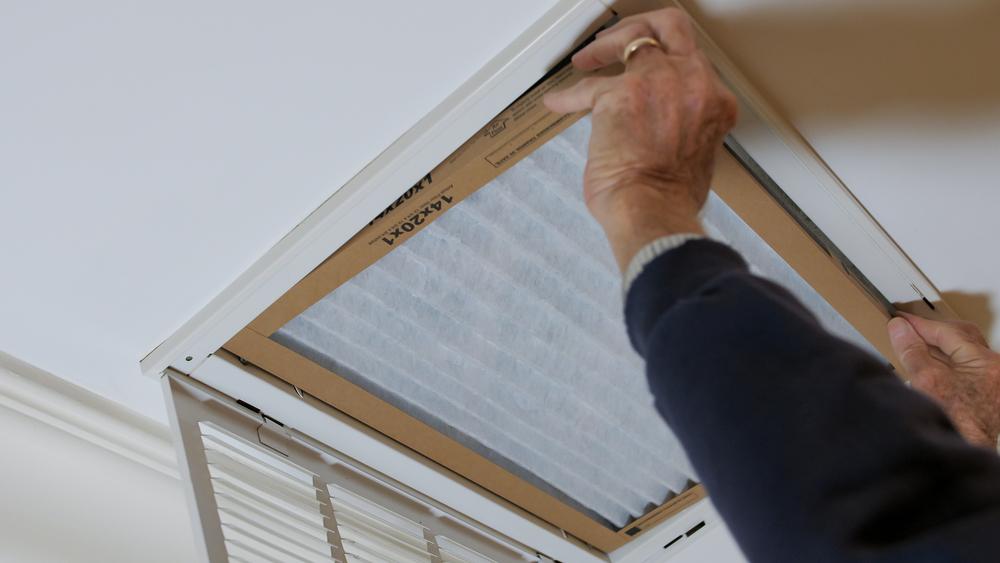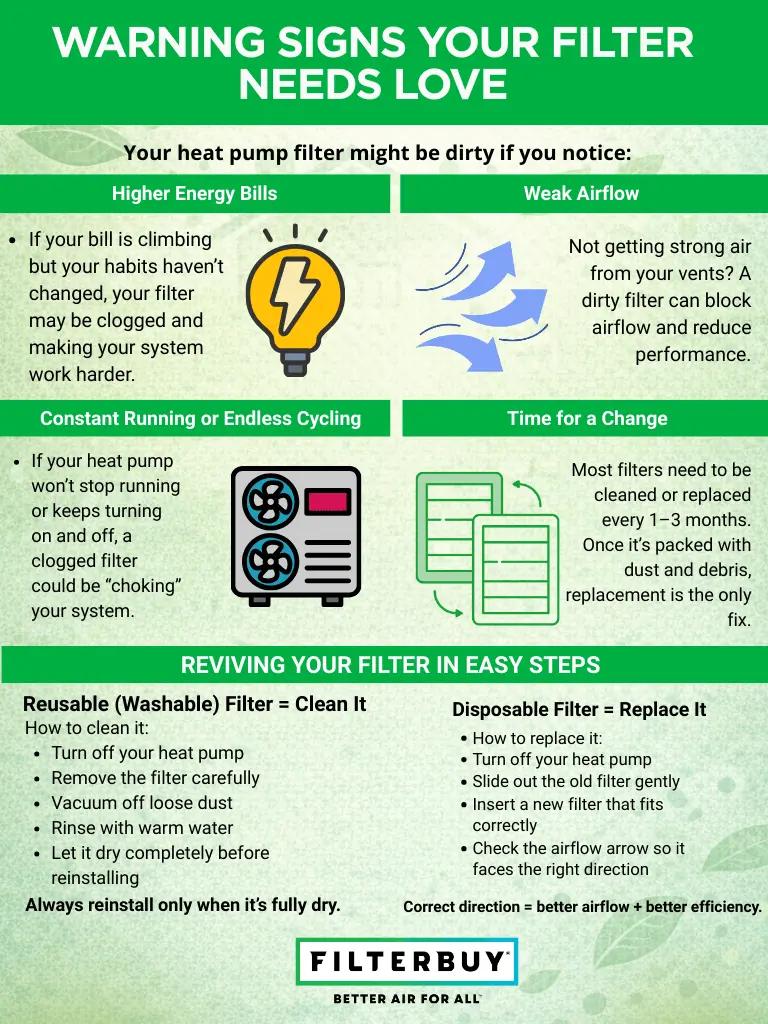Shop by

Behind the scenes of your HVAC system, heat pump filters quietly shape the comfort of your home. They don't seek the spotlight, but their job is nothing short of critical—capturing dirt, dust, and all the airborne riffraff that tries to sneak past. These filters are more than just parts; they're the unsung forces that fine-tune your energy usage, elevate indoor air quality, and keep your heat pump humming without missing a beat.
When it comes to performance, heat pump filters have a secret code: MERV ratings. It's not just about blocking grime; it's about finding the right balance. The highest ratings may block more, but they can also push your system to work overtime, straining to keep air flowing. Choose wisely, and your heat pump filters will deliver that sweet spot—keeping your air clean and your system running at full efficiency.
Heat pump filters do more than just block debris—they're the silent guardians of your system's health. Sifting through airborne particles, they ensure smooth airflow while shielding your heat pump from wear and tear. Quietly working in the shadows, their impact echoes through every breath you take.
Whether it's reusable, electrostatic, pleated, or HEPA, each filter plays its own role in shaping your comfort. The real challenge isn't picking one at random—it's about syncing the right filter with your system, your environment, and how you live. Every option has a unique purpose, engineered to handle the distinct needs of your home.
But here's the catch: more filtration isn't always better. Filters with high MERV ratings may trap more particles but can also choke your system, causing inefficiencies and higher energy use. The trick lies in finding that sweet spot—where clean air meets top performance without compromising efficiency.
Your heat pump filters crave a little care now and then, and giving them attention keeps your system running like a well-oiled machine. With regular check-ups, you're not just maintaining the filters—you're protecting the heart of your HVAC system.
Neglecting those maintenance routines allows particles to build up, choking the airflow and forcing your heat pump to work overtime. Clean filters, on the other hand, keep everything flowing smoothly, preventing the kind of wear that slows your system down over time.
The benefits go beyond just performance. Clean filters mean cleaner air, free from the dust and allergens that can sneak into your home if left unchecked. Routine care goes a long way in ensuring the air you breathe stays fresh.
And don't forget about the financial perks. Clogged filters drive up energy use and can lead to costly repairs. By keeping things clean, you're extending your heat pump's life, saving on those monthly bills, and avoiding expensive fixes down the road.

Your heat pump filter has its own way of signaling distress, and ignoring it can cost you. If your system starts struggling to perform, it's likely your filter is clogged, forcing your unit to work harder. This hidden battle can lead to higher energy bills, even if your usage hasn't changed.
When your system starts cycling endlessly or running without a break, it's waving a warning flag. A clogged filter is likely suffocating the airflow, forcing your heat pump to work overtime and inching closer to serious damage.
Filters don't last forever—most give out after one to three months. As they fill up with particles, their lifespan shortens. Once they're maxed out, swapping them out is the only way to keep your system in top shape.

When your filter starts wearing down, action is a must—whether that's a deep clean or a full swap. Step one? Know your filter: is it the reusable kind that needs a rinse, or is it disposable and ready for a fresh replacement?
For reusable filters, a careful clean is all they need. Start by powering down your heat pump and gently removing the filter to avoid spreading dust everywhere. Use a vacuum to lift away dirt, then rinse it under warm water. Patience is key—let it dry completely before putting it back to work.
With a disposable filter in hand, it's time for a quick swap and a fresh start. Again, power off your system first. Slide the old filter out gently, keeping dust from escaping into the unit, and replace it with a fresh one that fits just right. Pay attention to the airflow direction for optimal performance.
No matter which type you have, handle your filters with care. These small but mighty components ensure your heat pump runs smoothly and efficiently, making regular filter upkeep essential for a healthy system.
With a world of filters at your fingertips, finding the right match for your heat pump is key to keeping it running smoothly. It all starts with knowing the types—each designed for a specific purpose.
Basic options like fiberglass or polyester are easy on the wallet, efficiently handling larger particles. But for those looking to up their game, pleated filters or HEPA varieties go beyond, capturing even the tiniest particles. These high-efficiency options not only improve air quality but can also enhance your heat pump's performance.
Your go-to guide is the MERV rating. Higher numbers might promise top-tier filtration, but it's not a perfect fit for every setup. The tighter the filter, the harder your system works to breathe. The real trick? Finding that balance where clean air meets smooth performance without overworking the system.
Typically, filters should be replaced every 1 to 3 months, depending on usage and environment. Homes with pets or smokers may require more frequent changes. Seasonal checks are also recommended.
Yes, heat pumps have filters that prevent dust and debris from entering the system. Proper filter maintenance ensures clean air and keeps your heat pump running efficiently.
Even with a heat pump filter, some airborne particles may escape. An air purifier can help by capturing those smaller particles, ensuring cleaner and healthier air.
Filters range from basic fiberglass to premium pleated models. Fiberglass filters are cheaper but need frequent replacement, while pleated ones last longer and provide better filtration, though they may use more energy. Choose based on your needs for cost, maintenance, and energy efficiency.
A MERV rating of 8 to 11 is generally ideal for heat pumps. This range balances filtration performance and airflow, effectively capturing common household pollutants without overworking the system.
Check the filter monthly and clean it every 1 to 3 months. Remove the filter, vacuum loose dust, and rinse it with water. Avoid using chemicals or scrubbing, which can damage the filter.
The filter is usually inside the indoor air handler unit, often behind a removable panel. Regular checks ensure you stay on top of maintenance.
With proper maintenance, a heat pump can last 10-15 years or more. Neglecting upkeep can significantly shorten its lifespan.
Depending on the unit's design, a heat pump system may have multiple filters, including pre-filters, main filters, and supplementary filters.
Running a heat pump without a filter can cause airflow issues, allowing dust and debris to damage the system and reduce efficiency.
A dirty filter restricts airflow, forcing the heat pump to work harder and reducing efficiency. It can also lead to poor indoor air quality.
A clean filter is white or cream-colored. If it appears dark or discolored, it's time to clean or replace it to maintain efficiency.